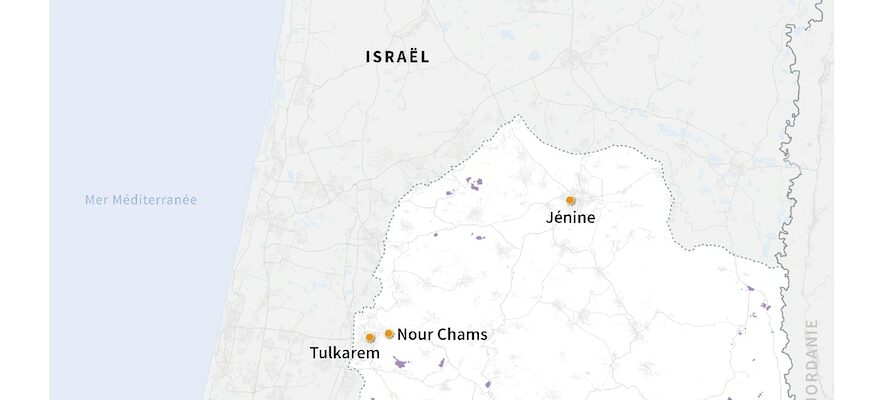The West Bank “faces an extremely tense” and “complicated” situation. This is the observation made this Tuesday, February 25 on franceinfo by Christian Cardon. The spokesman for the International Committee of the Red Cross (ICRC) described “a peak of violence that had not been seen for 23 years” in the Jénine and Tulkarem camps.
Israel announced on Sunday that its soldiers would remain for several months in three refugee camps in the north of the territory, after having expelled tens of thousands of inhabitants with prohibition to return home, as part of a large operation against groups Palestinian armed. This operation began on January 21, two days after the start of a fragile truce in the Gaza Strip between Israel and Hamas. It is the first time since the second intifada, the Palestinian uprising of 2000-2005, that Israel deploys tanks in occupied West Bank.
“Prepare for an extended stay”
The Israeli Defense Minister Israel Katz said he “gave soldiers to prepare for an extended stay […] For the coming year “, in the Jénine, Tulkarem and Nour Chams camps. He said that 40,000 Palestinians had been expelled, a figure also retained by the United Nations. According to the UN, the Israeli operation in Courses cost the lives of at least 51 Palestinians, including seven children, and three Israeli soldiers.
West Bank: the Israeli army targets three refugee camps
© / AFP.com/ioana Plesea, Sabrina Blanchard
Friday, Israeli Prime Minister Benyamin Netanyahu visited the troops in the territory and ordered the army to intensify its operations there. Government spokesman David Mencer said on Monday that dozens of “terrorists had been eliminated” and hundreds of other people in the West Bank. In Tulkarem and Jénine, the army has demolished dozens of explosive houses, opening new paths through these densely populated camps. Armored bulldozers have turned the ground, cutting the pipes. The army said that these operations were intended to rid the roads of explosives.
Islamic jihad, an important Palestinian armed group, castigated this operation carried out by Israel on Monday. According to this Islamist group Allied with Hamas, the deployment of tanks in the territory and the mass evictions confirmed “the plans of the occupation aimed at annexing the West Bank by force”. The Islamic jihad, very established in the north of the West Bank, described the operations in the process of “new act of aggression” aimed at “uprooting our people on their land”.
Israeli leaders have repeatedly expressed the wish to annex entire sections of this territory, occupied by Israel since 1967, colliding with the opposition of the Palestinians and the entire international community. Since the start of the war in Gaza on October 7, 2023, at least 900 Palestinians have been killed in this territory by Israeli soldiers or settlers, according to the Palestinian Ministry of Health. At least 32 Israelis, including soldiers, were killed in Palestinian attacks or in Israeli military operations, according to official Israeli data.
The “seriously concerned” UN
On Monday, before the Human Rights Council in Geneva, the UN secretary general, Antonio Guterres, said he was “seriously concerned” by the “rise in violence in the West Bank occupied by the Israeli colonists, as well as by calls for annexation “. The UN Humanitarian Affairs Office (OCHA) also worried the consequences of this operation on Monday, saying that “the continuous use of deadly war tactics in inhabited areas is extremely worrying”. The International Committee of the Red Cross is also “deeply worried” of the situation in the West Bank, according to a press release from the ICRC, adding that “people have difficulty accessing the basic needs such as drinking water, food, food, medical care and shelters “.
For its part, the European Union “closely follows the developments and does not hide its concern,” said the head of diplomacy Kaja Kallas on Monday. “The ceasefire is a real opportunity to break the cycle of violence. It is imperative to go to the second phase,” said Kaja Kallas at a common press conference with the Israeli Foreign Affairs Minister Gideon Saar. The second phase is supposed to end the war definitively, to which the Israeli far right ally of Benyamin Netanyahu opposes, threatening the survival of his government.
